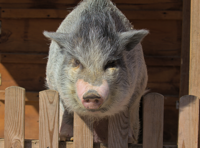DOVER, Del.–The Delaware Department of Agriculture approved requests from potbellied pig owners to microchip the animals rather than tagging them, after deeming them an invasive species last week.
Sussex County has seen an uptick of swine on the loose in recent years and took action to encourage owners to house their pigs responsibly.
Some owners do not want to tag their pet potbellies. State veterinarian Dr. Karen Lopez said she understands why.
“We know for many owners these pigs are their pets, many living in their homes like a dog or cat would, so the thought of an ear tag used for pigs on a farm is hard to handle,” she said.
According to Lopez, the permit process pushes owners to take initiative and ensure long-lasting care for their animals. She said proper housing, secure fencing and spay and neuter procedures are necessary to stop unwanted litters and behavioral problems.
“There are people out there who are accusing us of wanting just to kill these pigs, which is not the goal of this regulation,” Lopez said. “We now have a feral swine population of about 300 pigs, which stemmed from the abandonment and escape of potbellied pigs and potbellied-cross pigs.”
A department press release said owners must schedule an appointment with a licensed veterinarian to have each pig microchipped before their on-site inspections, and owners must present documented proof of the microchip’s universal number.
Pig owners will also be required to inform the department of any missing or escaped potbellies within 12 hours to coordinate a search response.
An Invasive Animal Permit is required for potbellied pigs, or any pig breed advertised as micro pigs, teacup pigs, mini pigs, pocket pigs, or pygmy pigs, or a potbelly cross including pigs with genetics from American Guinea Hogs, Julianas, KuneKune, and Meishan, according to the press release.



